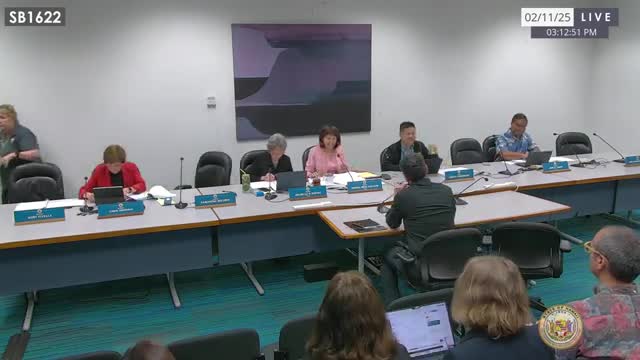University-backed bill would establish Aloha Intelligence Institute; Senate committees recommend SD1
Get AI-powered insights, summaries, and transcripts
Subscribe
Summary
Senate Bill 1622 would create an Aloha Intelligence Institute at the University of Hawaii to centralize AI governance, research, workforce development and outreach; university officials said the measure reflects campus input and requested positions across multiple campuses.
Senate Bill 1622, which would establish an "Aloha Intelligence Institute" at the University of Hawaii to coordinate artificial‑intelligence research, policy and workforce development statewide, received broad support in a joint hearing and was recommended with amendments.
Michelle Esturm, vice president for research, innovation and systemwide initiatives at the University of Hawaii, told the committees the measure was drafted after town halls on multiple campuses and external stakeholder input. "We conducted 2 large town halls that included over 10 campuses and actually, external, stakeholders," Esturm said. She described five pillars for the institute — governance and policy, outreach and engagement, research and development, workforce development, and AI tools for priority sectors such as health care, creative industries, advanced manufacturing, data science, astronomy and climate change.
Esturm said the university plans staffing distributed across campuses: a director and specialists for each of the five pillars, with "a couple positions in Manoa, 2–3 positions in Manoa, a couple positions at Hilo, and then 3 to 4 positions at community colleges and 1 at UH West Oʻahu and the director." She added the institute expects to hire nontraditional faculty categories such as "faculty of practice" drawn from industry to keep teaching current with fast‑changing technology.
Committee members asked about where the institute would be housed administratively. Esturm said it would start under the Office of the Vice President for Research and Innovation and could move under the president as it grows. Questions about tuition, enrollment and timelines were answered by university witnesses who said courses and certificate programs would generally be charged at the university's normal tuition rates and, if funded, operations could begin as early as next fall using a combination of internal carryforward and requested appropriations.
Committee amendments recommended blanking out appropriation amounts in the bill language, deferring the effective date to July 31, 2050, and forwarding discussions about housing and West Oʻahu priorities to the committee report. The Labor and Technology Committee recorded its recommendation as to pass with an SD1 and adopted the recommendation by recorded voice vote.
